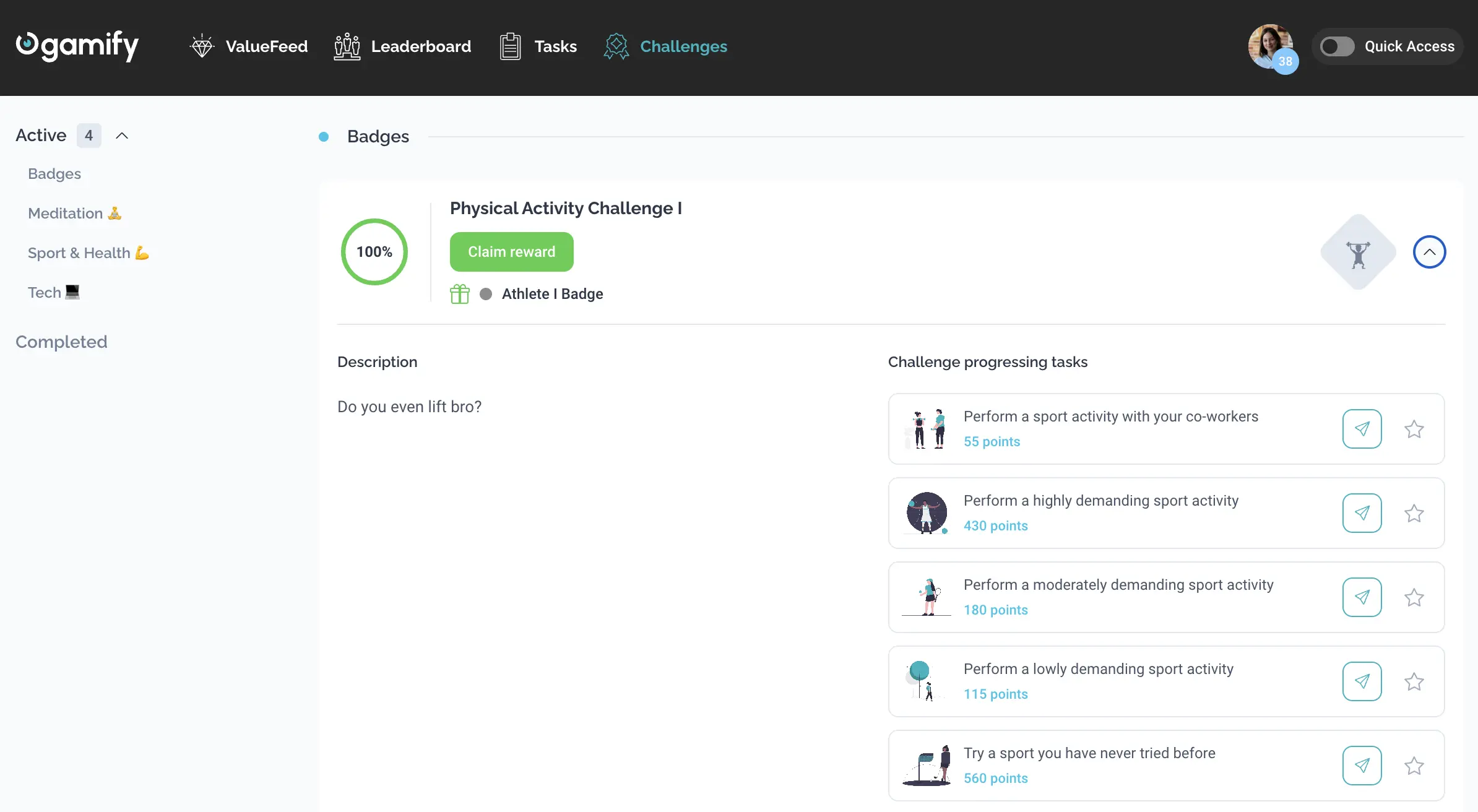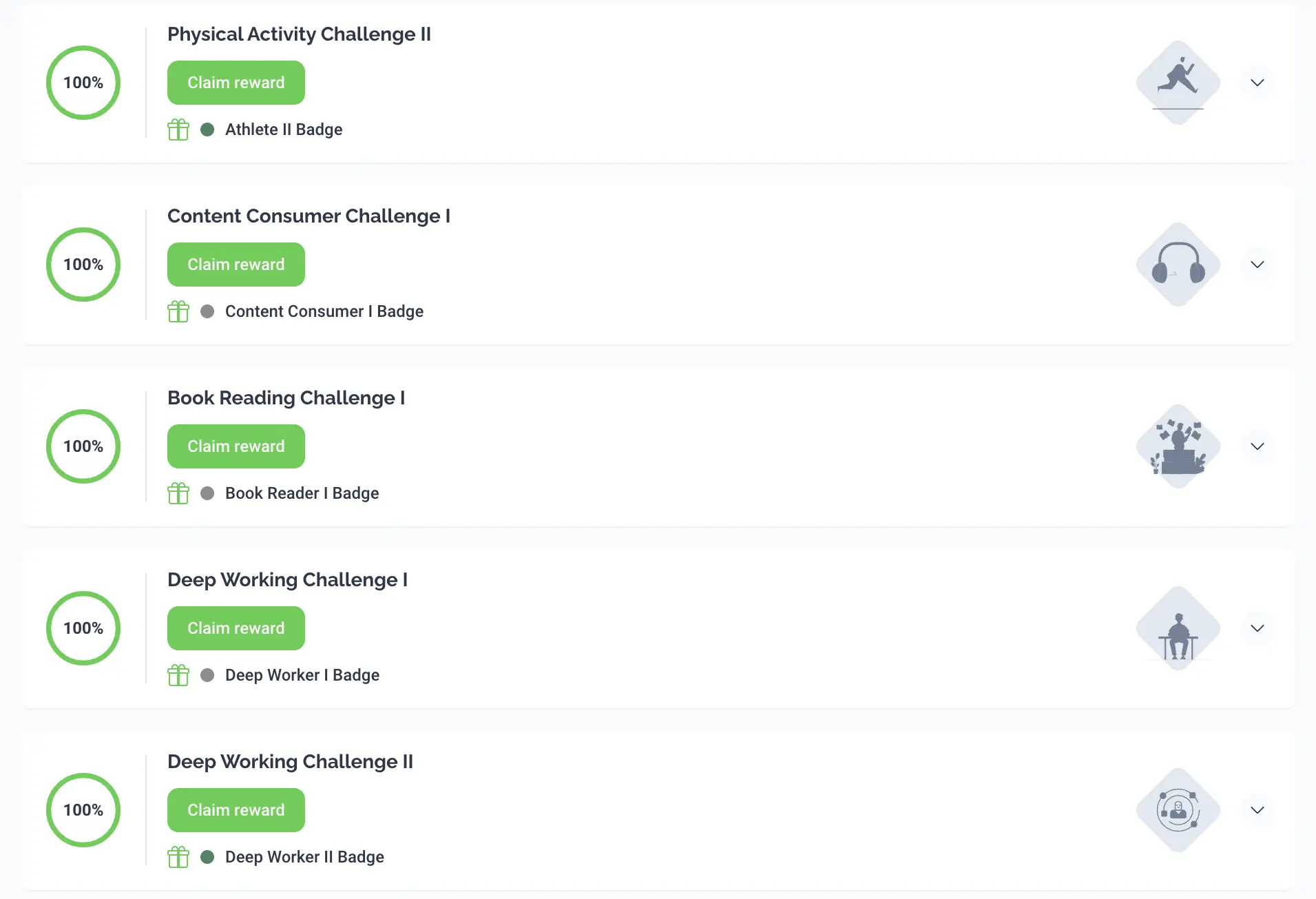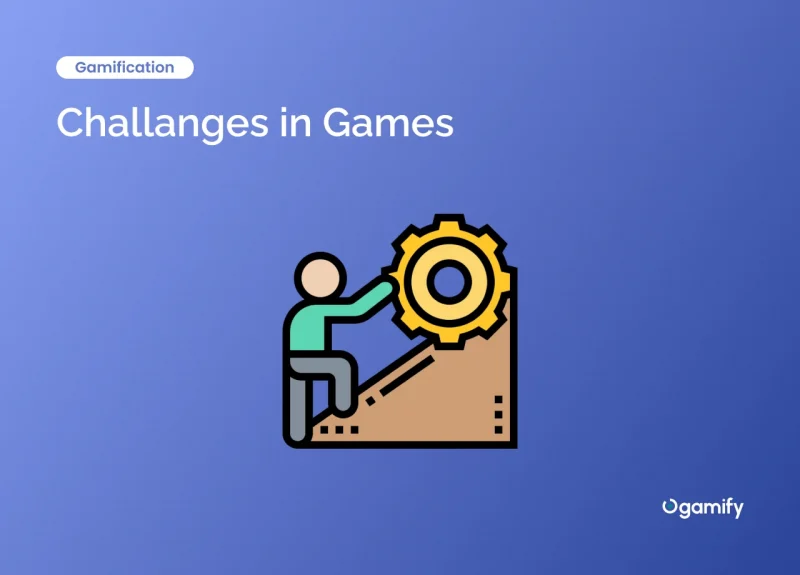Keeping employees motivated and engaged is essential in today’s fast-paced workplace. Using gamification challenges created to increase job motivation is one powerful strategy. By providing a respite from the everyday routine, these group challenges foster friendly rivalry, teamwork, and higher productivity.
By employing various types of challenges, companies can address different aspects of employee well-being, from mental to physical health, thus creating a more balanced and positive workplace.
What are Challenges in Games?

Challenges in games refer to obstacles, tasks, or goals that players must overcome or accomplish in order to progress or achieve success within the game. These challenges are intentionally designed to provide a level of difficulty and engagement, ensuring that players are actively involved and invested in the gaming experience.
Challenges can take various forms, ranging from physical skill-based tests to mental puzzles, social interactions, or even adaptive difficulties that adjust based on player performance. They serve as a means of pushing players to their limits, encouraging them to strategize, problem-solve, and utilize their skills and abilities to overcome obstacles. Challenges in games not only provide entertainment and a sense of accomplishment but also contribute to the overall immersion and satisfaction players derive from their gaming experiences.
One popular form of game challenge that can be used in gamification are group challenges. These require teamwork and cooperation, promoting effective communication among team members. Group challenges can be particularly beneficial in a work environment as they help address challenges of group work and improve overall team member dynamics.
Many different types of challenges can be incorporated in games and tailored to suit specific workplace needs. Fun group challenges can range from problem-solving and strategy-based activities to creative and physical tasks. These can also be adapted into fun fitness challenges at work, promoting team building exercises and a healthy lifestyle.
Other popular examples include fun challenges to do at work, where teams can take part in short-term or ongoing endeavours. These tasks can be entertaining, such as office bingo, or educational, like trivia and quiz games. They may also encompass fun health challenges at work, focusing on promoting a healthy work-life balance.
Types of Challenges

In the world of gaming, challenges play a vital role in shaping the overall experience for players. When properly designed, challenges elevate the gameplay, creating a sense of accomplishment and satisfaction. However, not all challenges are created equal, and understanding the different types of challenges can provide valuable insights into what makes a game engaging and enjoyable.
Skill-based challenge
Skill-based challenges require players to demonstrate their abilities, whether it’s precise timing, strategic thinking, or quick reflexes. These challenges often test a player’s dexterity, hand-eye coordination, and decision-making skills.
Skill-based challenges can be found in various genres, such as platformers, fighting games, and racing games, where players must hone their skills to overcome difficult obstacles or defeat formidable opponents.
Puzzle-based challenge
These challenges revolve around problem-solving and critical thinking. They present players with riddles, mazes, or intricate tasks that require logic and creativity to unravel.
Puzzle-based challenges can be found in adventure games, escape rooms, and even certain genres of mobile games. Solving these challenges often provides a sense of intellectual satisfaction, as players experience the thrill of unlocking secrets and discovering hidden pathways.
Social challenge
Moreover, they are also social challenges that exist in multiplayer and competitive games. These challenges involve interactions with other players, whether it’s cooperative teamwork or competitive showdowns.
Social challenges rely on players’ ability to communicate effectively, strategize together, or outwit opponents. They foster a sense of community and camaraderie among players, adding an additional layer of depth and excitement to the gaming experience.
Adaptive challenges
These challenges dynamically adjust their difficulty based on the player’s performance, ensuring a suitable level of engagement. Adaptive challenges are often seen in role-playing games, where enemies scale in strength as players progress, keeping the gameplay challenging and preventing it from becoming monotonous.
In conclusion, the significance of challenges in gaming cannot be emphasized enough. Understanding the dynamics of challenges can serve as a valuable tool in crafting your own gamification system, tailored to what has proven successful in games. Now, let us delve into the realm of real-life application and explore the immense power of incorporating challenges in gamification through the Ogamify app.
Examples of Ogamify Challenges

Ogamify is a platform designed to enhance productivity and workplace motivation by incorporating gamification challenges into daily tasks. By using elements from all different kinds of games, the platform motivate employees through group challenges, fostering a fun and vibrant workplace culture. The following are some examples of the challenges that can be encountered in Ogamify.
One popular type of challenge is fun group challenges that encourage collaboration and teamwork among employees. These challenges may involve solving puzzles or competing in quizzes related to their field of expertise. For example, the Ogamify platform offers fun fitness challenges at work, where employees can team up and track their steps or workouts as they compete for group rewards. This promotes a healthy lifestyle and encourages employees to bond and collaborate.

Another example includes challenges for games that reward employees for accomplishing individual milestones or mastering specific skills. Ogamify offers various types of challenges tailored to suit diverse learning styles and preferences, ultimately helping employees enhance their skills and gain confidence in their abilities. These challenges can range from timed tasks to skill-based missions designed to create a sense of accomplishment and drive personal development.
In addition to group and individual challenges, Ogamify recognizes the importance of addressing the challenges of group work. The platform offers features that allow managers to gain insights into team member dynamics and identify areas for improvement. Using performance analytics, Ogamify helps organizations optimize team building efficiency while keeping employees engaged.
With its gamification challenges, the Ogamify app has proven to be an effective tool in boosting fun and productivity in the workplace. By meeting employees’ diverse needs through various challenges, the platform promotes a positive, engaging workplace atmosphere. Employees are motivated to participate in fun health challenges at work and mission-driven tasks that contribute to their overall performance and growth.
Impact of Challenge in Games

The impact of challenges in games extends beyond the virtual realm. It spills over into real-life situations, where the skills and mindset cultivated through gaming challenges can be transferred and applied. Players develop an innate ability to approach problems analytically, think outside the box, and collaborate effectively with others.
The challenges encountered in games create a fertile ground for personal development, enhancing cognitive agility, creativity, and problem-solving skills that are invaluable in various professional and personal contexts.

Gamification is a powerful tool for creating team building games challenges involving techniques like leaderboards, rewards, badges, and levels. Leaderboards enable employees to track and compare their progress with their colleagues, fostering a competitive and inspiring work culture. Companies can utilize ValueFeeds and Integrate chats in their gamification systems, encouraging employees to share their achievements and knowledge. This fuels a sense of unity and cooperation among other team members.
Rewards, such as store discounts or unique badges, incentivize employees to participate in challenges and put forth their best effort. As individuals earn higher levels or badge tiers, they feel a sense of accomplishment, paving the way for increased motivation and excitement in pursuing higher goals.
Implementing challenges in workplace games is crucial in boosting employee motivation and collaboration. Companies can foster a more engaging and productive work environment by introducing various game challenges, from fitness-oriented tasks to gamification techniques.
Conclusion

Incorporating team game challenges in the workplace can effectively improve motivation and overall team performance. From group challenges like office Bingo to fun fitness challenges at work, integrating these activities can positively impact employee morale and productivity.
Organisations can consider various challenges, and choosing the suitable ones for your team motivation game may vary depending on the work setting, company culture, and individual employee preferences. Some challenges of group work can be addressed by adapting game challenges according to the specific needs of the group. For instance, creative problem-solving games or team building activities can facilitate improved communication and collaboration.
Gamification challenges combine game mechanics with typical work tasks, creating a unique blend of fun and work goals. These challenges enhance engagement and contribute to the growth of employees’ skill sets. By implementing gamification strategies, organizations can tap into the power of motivational game and ultimately elevate the overall work experience.
FAQ
What challenges motivate us to work?
Different individuals are motivated by different challenges in the workplace. Some common challenges that can motivate employees include setting and achieving goals, solving complex problems, working on challenging projects, taking on leadership roles, and being recognized for their achievements. It’s important for employers to understand the specific motivators for each employee and create an environment that allows them to face meaningful challenges aligned with their skills and interests
What are the games for motivation?
Several games and gamified approaches can be used to enhance motivation in various settings. Some popular examples include:
– Leaderboards and competitions: Introducing friendly competition among employees can spark motivation as they strive to achieve higher rankings or outperform their peers.
– Rewards and incentives: Games that offer rewards, such as points, badges, or tangible prizes, can motivate individuals to complete tasks or reach specific milestones.
– Progress tracking: Games that provide visual representations of progress, such as progress bars or levels, can encourage individuals to keep working towards their goals.
– Simulations and role-playing: Immersive games that simulate real-world scenarios or allow individuals to take on different roles can boost motivation by making tasks more engaging and interactive.
What activities promote motivation?
Various activities can promote motivation in the workplace. Some examples include:
– Setting clear goals and expectations: When employees have clear objectives and understand how their work contributes to larger goals, it can increase their motivation to perform well.
– Providing feedback and recognition: Regular feedback and recognition for a well-done job can make employees feel valued and appreciated, enhancing their motivation.
– Offering learning and growth opportunities: Activities that provide opportunities for skill development, career advancement, and personal growth can significantly motivate employees.
– Fostering a positive work environment: A supportive and positive work culture that promotes collaboration, open communication, and work-life balance can increase employee motivation.
Why are gamification challenges effective for increasing job motivation?
Gamification challenges leverage elements from games to make work tasks more engaging and enjoyable. They provide clear goals, feedback, and a sense of progression, which can significantly enhance motivation. By incorporating game mechanics like rewards, competition, and achievement tracking, gamification challenges tap into intrinsic motivators such as autonomy, mastery, and purpose. They create a more immersive and interactive experience, making work feel less mundane and more rewarding, ultimately increasing job motivation.
What role do challenges play in gamification and employee engagement?
Challenges are fundamental to gamification and employee engagement. They provide a sense of purpose and direction, allowing employees to set goals and work towards achieving them. Challenges create a stimulating environment that encourages individuals to stretch their abilities, learn new skills, and overcome obstacles. They foster a sense of accomplishment and progress, boosting employee engagement. Organizations can promote a positive and motivating work culture that encourages continuous growth and development by incorporating well-designed challenges into gamification systems.


